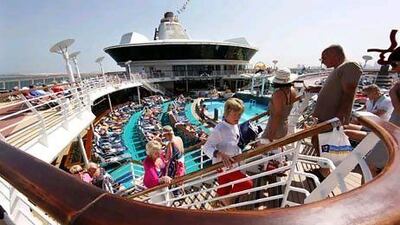Royal Caribbean cruise bookings from the Middle East surged in the first quarter despite a spate of safety scares that has shaken confidence in the global industry.
The cruise ship operator attributed the increase to a marketing drive aimed at boosting awareness among regional travellers.
"We are 30 per cent up, first quarter to first quarter [last year]," said Lakshmi Durai, the executive director, Middle East, at Royal Caribbean. "We still have a huge population that is [yet] to experience cruising, so potential is high. Awareness is being created."
Following the Costa Concordia disaster, in which the cruise ship ran aground off the coast of Italy, resulting in the deaths of at least 30 people, cruise companies including Costa and Royal Caribbean reported a decline in bookings worldwide.
In February, a fire broke out aboard the Costa Allegra, which was sailing near the Seychelles, and the ship had to be towed to port. Last week, crew members on the Azamara Quest, a cruise ship sailing off the Philippines, were injured in a fire. Azamara is a subsidiary of Royal Caribbean.
Travel agents said sales for Costa's cruises had been negatively affected.
"Certainly the Costa Concordia incident has impacted their sales and as a result hurt the pricing," said Ashok Kumar, the managing director of Cruise Master, one of the biggest cruise agents in the Middle East. "To overcome this impact, initially the pricing was dropped down to US$399 [Dh1,465] per person for a seven-night Mediterranean cruise and demand seems to be bouncing back.
"Other cruise lines like Norwegian and Princess are holding on to their prices with reasonable demand."
The cruise industry is also playing an increasingly important role in the UAE's tourism growth strategies. Growth over the past decade has been phenomenal in the sector. In 2001, Dubai received just 6,900 passengers on a handful of cruises that stopped in the emirate. Now, the UAE is considered to be the regional hub for the industry and last year Dubai received about 135 cruise ships with 375,000 tourists, according to figures from the Dubai Department of Tourism and Commerce Marketing.
By 2015, Dubai hopes to attract 180 cruise calls, carrying 625,000 passengers. In October, the emirate announced plans to build a cruise terminal to accommodate the expected growth in the number of passengers.
Abu Dhabi has plans to attract 300 ships and more than 600,000 passengers a year by 2030.
In the capital, MSC Cruises last year became the first cruise-ship company to use Abu Dhabi as its base for sailings.
Carnival, which owns Costa, last week said it did not expect the Concordia disaster to have a long-term impact.
"Since the date of the accident in mid-January our fleetwide booking volumes, excluding Costa, had declined in the mid to high single digits at slightly lower prices compared to the prior year," Carnival said.
"In addition, booking volumes for Costa were running significantly behind the prior year at lower prices, however, Costa had curtailed virtually all of its marketing activities during this period."
Ms Durai said Royal Caribbean had not had any cancellations for its regional cruises or cruises booked by Middle East travellers, and that its cruises around the Gulf had run at levels comparable to last year, close to capacity.
The Mediterranean is the most popular destination for cruises booked out of the region, she said.
Seventy per cent of bookings made within the Middle East are made by locals within those countries.
This year, Royal Caribbean plans to bring its newly refurbished Serenade of the Seas ship to Dubai for its cruises around the region.
twitter: Follow our breaking business news and retweet to your followers. Follow us

